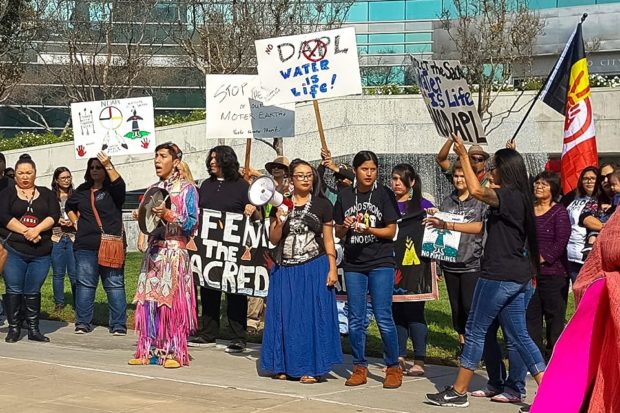
By Hannah Brandt
Central Valley tribes held three events in Fresno in November to educate the public about the Dakota Access Pipeline (DAPL) and support native peoples protecting the land and water at the Standing Rock Sioux reservation that would be impacted if Dakota Access Oil Company and Energy Transfer Partners get their way. The first demonstration was on November 4 at Fresno City Hall, the second was at Fashion Fair Mall on November 6, and the third was on November 17 at Fresno City College (FCC).
The peaceful events were reverent, including prayer circles with chants, drumming, and ceremonial sage burning as well as marches in front of city hall, on campus at FCC, and down Shaw Ave. Songs were sung to honor the dead and the Earth. At the event outside city hall, participant Stony Dodson was dressed in traditional ceremonial attire. Some traveled many miles from reservations throughout the Valley.
The gatherings were organized by Natalie Deanda-Lopez and John Bo Deanda who put out the call on social media to join the action. “We would like to bring more awareness to the environmental and humanitarian injustice taking place right now in Cannon Ball, North Dakota. The Dakota Access Pipeline is a 1,172-mile pipeline being put up by Dakota Access Oil Company, that will run through the Missouri River and transfer crude oil from North Dakota to existing pipelines in Illinois. The pipeline threatens clean drinking water for the 18 million people whose water supply comes from the Missouri River, which will also affect the wildlife and many other natural resources that feed off that water supply.

There are thousands of people in Cannonball, ND right now peacefully protecting our human right to clean water. The Morton County Sheriff Department is using excessive force and attempting to prohibit them from using their first and fourth amendment rights. The DAPL workers have even plowed through sacred burial grounds of the Sioux people to start the construction. If you believe in environmental protection, the human right to clean drinking water, stopping police brutality, and keeping Big Oil companies such as Dakota Access from controlling our government, please come take a stand with us. Show our local government this is not just an issue for the people of the North Dakota, it is an ongoing issue for all people that inhabit Mother Earth.”
The concerns of indigenous people also come from reports that there were at least eight oil pipeline explosions in 2016, causing fires, damaging homes, and causing dozens of casualties. 2.5 million miles of U.S. pipelines, some of them almost brand new, have had ruptures and leaks, leading to deaths and oil spills. A stakeholder in Dakota Access Pipeline (Enbridge) was responsible for the worst oil spill in U.S. history, when an oil line burst and flowed into Talmadge Creek, leading to the pollution of the Kalamazoo River in Michigan in 2010. There have been three oil pipeline accidents in California in the last year.
Reuters reported that DAPL subsidiary Sunoco Logistics (which has a connecting terminal station in Texas) has the worst record on oil spills in the industry with 200 in the last six years. These explosions and spills expose people to toxic chemicals and contaminate their drinking water. State governments rely on grants from the federal government for pipeline safety programs, often leaving the oil companies to do the inspections themselves. According to the U.S. Dept of Transportation’s website, there are just over 300 state pipeline inspectors nationwide. Each state averages about a million dollars in federal grants for oil pipelines, which is significant given that one oil pipeline accident can cost hundreds of thousands of dollars in damage.
In the time since the last No DAPL actions in Fresno in September, the situation in North Dakota has gotten worse. In an early November interview with Huffington Post’s Now This! when President Obama was asked if his administration would intervene, he said “I believe there is a way for us to accommodate the sacred lands of Native Americans. Right now, the Army Corps of Engineers is examining whether there are ways to reroute this pipeline. We’re going to let this play out for several more weeks and see if this can be resolved in a way that I think is properly attentive to the traditions of the first Americans.”
The interviewer then asked if there was something to be done about the way the protesters were being treated, citing the fact that police had hit them with rubber bullets. The president responded that “it is a challenging situation.” Instead of denouncing these actions as misconduct by police, he said that protesters had “a responsibility to be peaceful and law enforcement had a responsibility to show restraint.” He claimed that “both sides must refrain from situations that might cause people to be hurt.” Since then local police and those brought in from surrounding states have sprayed water protectors with high powered water hoses in freezing cold conditions as well as shot tear gas and concussion grenades at close range. As the water protectors continue the fight and brace for the winter, there is an increasingly urgent need for medical attention.
Update after publication: On December 4, Pres. Obama and the U.S. Army denied the easement through Lake Oahe and announced that there will be an environmental impact statement review. They will consider alternative routes for the Dakota Access Pipeline than the area around the Standing Rock Reservation. There are still water protectors staying there to ensure the pipeline project that has begun is not completed. For more details: https://indiancountrytodaymedianetwork.com/2016/12/11/whats-next-water-protectors-standing-rock-166707
*****
Hannah Brandt is the editor of Community Alliance newspaper. You can follow her on Twitter and Instagram at @HannahBP2. Follow the paper on Facebook at Community Alliance Newspaper and on Twitter and Instagram @fresnoalliance.
